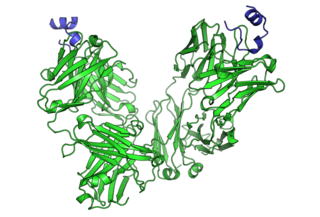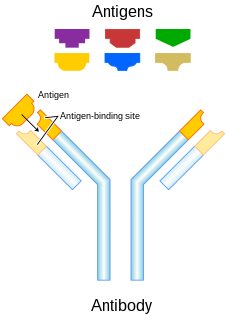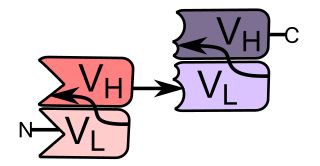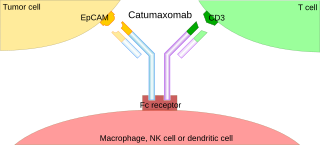Related Research Articles
Cytokine release syndrome (CRS) is a form of systemic inflammatory response syndrome (SIRS) that can be triggered by a variety of factors such as infections and certain drugs. It refers to cytokine storm syndromes (CSS) and occurs when large numbers of white blood cells are activated and release inflammatory cytokines, which in turn activate yet more white blood cells. CRS is also an adverse effect of some monoclonal antibody medications, as well as adoptive T-cell therapies. When occurring as a result of a medication, it is also known as an infusion reaction.

Cancer immunotherapy is the stimulation of the immune system to treat cancer, improving on the immune system's natural ability to fight the disease. It is an application of the fundamental research of cancer immunology and a growing subspeciality of oncology.

Monoclonal antibody therapy is a form of immunotherapy that uses monoclonal antibodies (mAbs) to bind monospecifically to certain cells or proteins. The objective is that this treatment will stimulate the patient's immune system to attack those cells. Alternatively, in radioimmunotherapy a radioactive dose localizes a target cell line, delivering lethal chemical doses. Antibodies have been used to bind to molecules involved in T-cell regulation to remove inhibitory pathways that block T-cell responses. This is known as immune checkpoint therapy.

Hemophagocytic lymphohistiocytosis (HLH), also known as haemophagocytic lymphohistiocytosis, and hemophagocytic or haemophagocytic syndrome, is an uncommon hematologic disorder seen more often in children than in adults. It is a life-threatening disease of severe hyperinflammation caused by uncontrolled proliferation of activated lymphocytes and macrophages, characterised by proliferation of morphologically benign lymphocytes and macrophages that secrete high amounts of inflammatory cytokines. It is classified as one of the cytokine storm syndromes. There are inherited and non-inherited (acquired) causes of hemophagocytic lymphohistiocytosis (HLH).
Ocrelizumab, sold under the brand name Ocrevus, is a pharmaceutical drug for the treatment of multiple sclerosis (MS). It is a humanized anti-CD20 monoclonal antibody. It targets CD20 marker on B lymphocytes and hence is an immunosuppressive drug. Ocrelizumab binds to an epitope that overlaps with the epitope to which rituximab binds.
Visilizumab is a humanized monoclonal antibody. It is being investigated for use as an immunosuppressive drug in patients with ulcerative colitis and Crohn's disease. Visilizumab binds to the CD3 receptor on certain activated T cells without affecting resting T cells. It is currently under clinical studies for the treatment of ulcerative colitis and Crohn's disease.
Tanox was a biopharmaceutical company based in Houston, Texas. The company was founded by two biomedical research scientists, Nancy T. Chang and Tse Wen Chang in March 1986 with $250,000, which was a large part of their family savings at that time. Both Changs grew up and received college education in chemistry in National Tsing Hua University in Taiwan and obtained Ph.D. degrees from Harvard University. For postdoctoral training, Tse Wen shifted to immunology and did research with Herman N. Eisen at the Center for Cancer Research, M.I.T. The two Changs successively became research managers and worked with a range of monoclonal antibody projects in Centocor, Inc. based in Malvern, Pennsylvania, from 1981 to 1985. The Changs were recruited by Baylor College of Medicine toward the end of 1985 and offered faculty positions in the Division of Molecular Virology. Soon after their arrival, they were encouraged by a high-ranking Baylor official and local business leaders to start a biotech venture in Houston. This was in a period of time when the economy of Houston was in slump as the result of the collapse of the oil industry.
Lebrikizumab (INN) is a humanized monoclonal antibody and an experimental immunosuppressive drug for the treatment of asthma that cannot be adequately controlled with inhalable glucocorticoids. The drug was created by Tanox under the name TNX-650, and a phase I clinical trial for refractory Hodgkin’s lymphoma had been performed when Genentech acquired Tanox in 2007. It has successfully completed a Phase II clinical trial for the treatment of asthma.
An anti-CD22 immunotoxin is a monoclonal antibody linked to a cytotoxic agent. They are being studied in the treatment of some types of B-cell cancer.

Bi-specific T-cell engagers (BiTEs) are a class of artificial bispecific monoclonal antibodies that are investigated for the use as anti-cancer drugs. They direct a host's immune system, more specifically the T cells' cytotoxic activity, against cancer cells. BiTE is a registered trademark of Micromet AG.
MorphoSys AG is a biopharmaceutical company founded in 1992. The company is headquartered near Munich, Germany and has a wholly owned subsidiary, MorphoSys US Inc., in Boston MA in the US. The company has various antibody, protein and peptide technologies that it uses to discover and develop both proprietary and partnered drug candidates. The company has more than 100 drugs in its wider pipeline that are being investigated for a variety of diseases. While many of these are being developed in partnership with pharma and biotech companies, MorphoSys also has a proprietary pipeline with a focus on cancer and autoimmune diseases.

Tolerx, Inc. was a biopharmaceutical company headquartered in Cambridge, Massachusetts. The company was focused on discovering and developing new therapies designed to treat patients by reprogramming the immune system, allowing for long-term remission of immune-related diseases after a short course of therapy. Targeted diseases include type 1 diabetes, rheumatoid arthritis, Inflammatory bowel disease (IBD), cancer, chronic and viral diseases. In 2008, Tolerx was named one of Fierce Biotech’s Fierce 15. In October 2011, Tolerx was shut down due to an unsuccessful Phase III trial in patients recently diagnosed with Type 1 diabetes.

A trifunctional antibody is a monoclonal antibody with binding sites for two different antigens, typically CD3 and a tumor antigen, making it a type of bispecific monoclonal antibody. In addition, its intact Fc-part can bind to an Fc receptor on accessory cells like conventional monospecific antibodies. The net effect is that this type of drug links T cells and monocytes/macrophages, natural killer cells, dendritic cells or other Fc receptor expressing cells to the tumor cells, leading to their destruction.
Amatuximab is a chimeric monoclonal antibody designed for the treatment of cancer. It was developed by Morphotek, Inc.
Crenezumab is a fully humanized monoclonal antibody against human 1-40 and 1-42 beta amyloid, which is being investigated as a treatment of Alzheimer's disease. Crenezumab is highly homologous to solanezumab, another monoclonal antibody targeting amyloid-β peptides. In June 2022, the US National Institutes of Health announced that the drug failed as a medication for early-onset Alzheimer's disease following the results of a decade-long clinical trial.
Solitomab is an artificial bispecific monoclonal antibody that is being investigated as an anti-cancer drug. It is a fusion protein consisting of two single-chain variable fragments (scFvs) of different antibodies on a single peptide chain of about 55 kilodaltons. One of the scFvs binds to T cells via the CD3 receptor, and the other to EpCAM as a tumor antigen against gastrointestinal, lung, and other cancers.
Seagen Inc. is an American biotechnology company focused on developing and commercializing innovative, empowered monoclonal antibody-based therapies for the treatment of cancer. The company, headquartered in Bothell, Washington, is the industry leader in antibody-drug conjugates or ADCs, a technology designed to harness the targeting ability of monoclonal antibodies to deliver cell-killing agents directly to cancer cells. Antibody-drug conjugates are intended to spare non-targeted cells and thus reduce many of the toxic effects of traditional chemotherapy, while potentially enhancing antitumor activity.
ImmunoGen, Inc. is a biotechnology company focused on the development of antibody-drug conjugate (ADC) therapeutics for the treatment of cancer. ImmunoGen was founded in 1981 and is headquartered in Waltham, Massachusetts.
Emapalumab, sold under the brand name Gamifant, is an anti-interferon-gamma (IFNγ) antibody medication used for the treatment of hemophagocytic lymphohistiocytosis (HLH), which has no cure.
Idecabtagene vicleucel, sold under the brand name Abecma, is a cell-based gene therapy to treat multiple myeloma.
References
- ↑ "Novimmune's NI-0501 Granted Breakthrough Therapy Designation by US FDA for Treatment of Patients With Primary Hemophagocytic Lymphohistiocytosis (HLH) - FierceBiotech". www.fiercebiotech.com.
- ↑ "Novimmune SA: Private Company Information - Bloomberg". www.bloomberg.com.
- ↑ "First in Human Study of an Anti-Toll-like Receptor 4 (TLR4) Monoclonal Antibody (NI-0101) in Adult Healthy Volunteers - Full Text View - ClinicalTrials.gov".
- ↑ "Pipeline - NI-0101 anti-TLR4". www.novimmune.com.
- ↑ "NI-0401 in Patients With Acute Renal Allograft Rejection - Full Text View - ClinicalTrials.gov".
- ↑ "Pipeline | NI-0501 anti-IFNγ". Archived from the original on 2017-01-13. Retrieved 2017-01-11.
- ↑ "Long-term Follow-up of HLH Patients Who Received Treatment With NI-0501, an Anti-interferon Gamma Monoclonal Antibody - Full Text View - ClinicalTrials.gov".
- ↑ "A Study to Investigate the Safety and Efficacy of an Anti-IFNγ mAb in Children Affected by Primary Haemophagocytic Lymphohistiocytosis - Full Text View - ClinicalTrials.gov".
- ↑ "Emapalumab - NovImmune - AdisInsight". adisinsight.springer.com.
- ↑ "Pipeline - NI-1401 anti-IL17". www.novimmune.com.
- ↑ "Pipeline - NI-1801 anti-CD47/Mesothelin". www.novimmune.com.